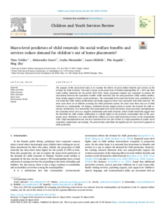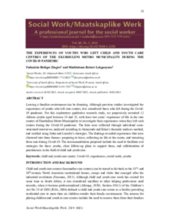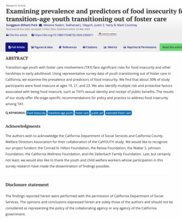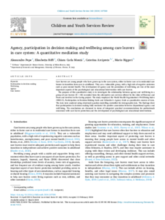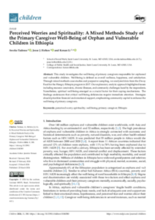Displaying 431 - 440 of 14575
This convergent mixed methods study builds knowledge surrounding preparedness among a sample of young adults with histories in out-of-home care in the U.S.
The purpose of this macro-level study is to examine the effects of social welfare benefits and services on the demand for child removals. The study is based on the panel data of Finnish municipalities and their social welfare indicators for the period 2010–2021.
The authors of this exploratory qualitative research study recruited 12 African youths aged between 18 and 23, with at least two years’ experience of life in the care centres of Ekurhuleni Metro Municipality in Gauteng, South Africa, to investigate their experiences when they left these centres during the COVID-19 pandemic.
After he was snatched, Antonio Salazar-Hobson didn’t see his family for 24 years. His desire to return to his mother, and his discovery of a higher purpose, helped him navigate a path through hell.
Using representative survey data of youth transitioning out of foster care in California, the authors of this study examine the prevalence and predictors of food insecurity. They found that about 30% of study participants were food insecure at ages 19, 21, and 23.
This study examines the health of Canadian youth in care and their engagement with the Canadian health care system on a population level.
The purpose of this quantitative study is to investigate the relationship between agency and well-being in a group of care leavers (N = 48) recruited from the alternative care services offered by the cities of Florence and Prato in Italy and involved in the Caring project.
This comes amid growing protests against the plan, which critics say would create a new class of stateless people.
This study investigates the well-being of primary caregivers responsible for orphaned and vulnerable children in Ethiopia. Well-being is defined as overall wellness, happiness, and satisfaction.
An aid official who travelled the length of Gaza this week has described scenes of “utter annihilation”, with “nothing left” of what were once thriving and crowded cities in the territory. “The depth of the horror surpasses our ability to describe it,” said James Elder, a spokesperson with the United Nations Children’s Fund (UNICEF).


